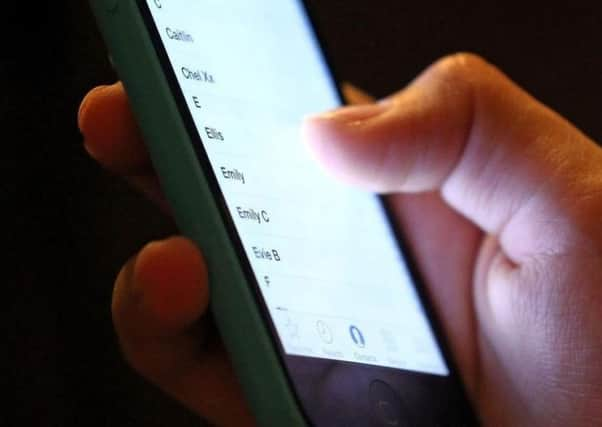GP Taylor: How I broke free from tyranny of the smartphone


All are staring mesmerised by the screens that are held in their hands. Food is brought and placed before them as one by one they put away their smartphones, reluctantly ditch social media and start to eat. Suddenly they are a family again. Except for the girl who manages to sneak a peek at her phone between bites of bacon.
Many times, I have seen parents use iPads or smartphones as a way of babysitting through meals. I have had to endure the sound of cartoons blasting away at the next table as the mother lets her offspring watch Paw Patrol as she posts a picture of her lunch on Instagram.
Advertisement
Hide AdAdvertisement
Hide AdIt’s not just in cafés where the lure of social media is in control of our minds. Each day at 6.45am I watch the faithful jogger go past my house clad in lycra whilst watching the screen of their smartphone as they run by.
On buses and trains the electronic mind control is the same. People are plugged in with earphones unaware of the journey or the people around them. Eye contact is avoided in fear that another human may actually speak to them. All the while they are being exposed to fake news and manipulated by greedy companies intent on selling their personal data.
According to recent research by Ofcom, an average person checks their phone every 12 minutes, and is online for 24 hours each week. Some people click or swipe over 2,000 times per day. A staggering 78 per cent couldn’t live without their smartphone. Data shows that the average people now spend over two hours a day on their smartphone, not good for our mental health.
In fact, researchers at the University of Pittsburgh found that people who visited social media sites more than 58 times per week, were three times more likely to experience loneliness than those who went online less than nine times per week. There you have it. Social media makes you sad and anxious.
Advertisement
Hide AdAdvertisement
Hide AdA recent survey of more than 1,000 young people across America aged 18 to 24 years discovered a total of 41 per cent are made to feel anxious, sad, or depressed by platforms like Facebook, Instagram, and Snapchat.
Personally, I always found that social media made me feel inferior, friendless and missing out on life. I seldom went to the parties I saw on Facebook. My holidays were never as glamorous as those of the people I knew. I was obviously a failure and there were other people’s pictures to prove it.
It took a while to realise that social media is a place of fantasy and anyone with a decent camera can make a mundane life look amazing.
Nearly a year ago I ditched the lot. Everything went, even my phone number. The sense of freedom was instantly amazing. I had more time, was less anxious and wasn’t constantly checking for new messages.
Advertisement
Hide AdAdvertisement
Hide AdI found I could live without knowing what all my ‘friends’ were doing and never again had to look at pictures of my neighbour’s kitten. I spoke to real life people, had deeper conversations and knew that if friends wanted me they could email.
Like a growing number of people, I went on a digital detox but mine was for good. My sleep improved but I was frightened to discover that the blue light from laptops and phones can cause macular degeneration and lead to blindness. Was I too late giving up?
There is an answer. Many people are turning away from smartphones and returning to ‘dumb phones’, those that you can only talk through or send a text. Sales of these devices rose by five per cent last year, smartphone sales only rose by two per cent.
Perhaps the lure of being globally connected and instantly contactable is losing its appeal. All I can say is that ditching social media handed back control of my life to me. I am no longer at the beck and call of Mark Zuckerberg pushing irrelevant advertising into my brain. I cannot be hacked or trolled and never have to look at someone else’s dinner unless I am at the table with them.
Advertisement
Hide AdAdvertisement
Hide AdThere is no longer a need to take endless photographs to post on Instagram. I now experience events through my own eyes and keep the image of them in my memory. My only selfie is looking in the mirror in the morning to check how much hair I have left and the only tweet I have around me is that of the birds in Pannet Park. There is life after Facebook – you should try it.